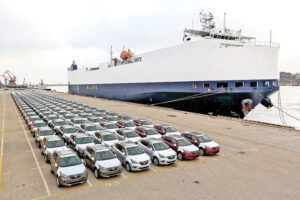Selection: The process of abolishing gasoline cars has started and different countries have set different rules for it. All the countries of the world are moving towards the production of electric cars and eventually there will be cars that have zero pollution.
These days, electric cars are conquering the world and taking the place of gasoline cars. This incident affects the future of mankind and energy management, in which the developing countries may not have a special advantage. In the structure of gasoline cars, the Middle East and its huge oil reserves were the players of the world's cars, but now lithium and batteries are the spokesmen of the future of the world's car economy, and the Middle East may remain a consumer. In the meantime, there are also concerns about the operation of electric cars, which will decrease over time and with the further technical development of these cars.
In order to investigate the above issue, we talked to Saeed Jafari, an expert in the production and testing of electric vehicle battery management software, which we read in detail below:
Electric cars are heard a lot in the news these days, and its scope has extended to Iran; First, give a history of this project.
The design of electric machines began between 1900 and 1903, but before that in 1830 a concept of electric machines was formed. The first person in America to design a small electric car in 1835 Thomasport. At that time, Robert Anderson, a Scottish inventor, also made an electric car at the same time, but it did not catch on. The first serious electric machine was implemented by Edison in 1880, and in Germany, Andreas Flucken made an electric machine in 1888. In the early 1900s, electric cars became popular and were even used for taxis for a short period of time. Cities like New York and London used electric taxis for the first time. There are still electric car chargers in America that were used in 1903. The reasons for using an electric car were its quietness and its fuel. In the mid-1950s, although there were a series of successes in this field, there were also a series of serious challenges. Including the short range of electric cars and the abundance of gasoline and diesel cars, the electric car remained on the sidelines and failed. The mass production and ease of use of gasoline and diesel cars, as well as the development of gasoline engine technology, made electric cars questionable. The electric car movement was re-formed by governments in the early 2000s due to environmental concerns and independence from gasoline and oil. Many companies also started working to revive this concept. If you ask Google, it shows that Elon Musk's collection restarted this movement, and in 2008, a more serious leap occurred with the Tesla car, showing that an electric car can compete with gasoline cars in terms of power and acceleration. After Tesla started this process, other car companies started working and saw a good future in the electric car. Finally, many governments also provided incentive packages for its production and purchase, an example of which was the placement of battery charging stations in cities.
How many times have electric cars failed on their way?
In 1990, the California Air Safety Board, a powerful state agency, began to put serious pressure on automakers to produce cars with less pollution. Right now, most of my work time is related to the car battery software taking care of the sensors in a way that does not cause air pollution. The ultimate goal of this organization was to reach 0% car pollution for 2% cars by 1998. This law created huge challenges and did not reach full results. In 1992, in California, they gave a thousand dollar tax credit to drive electric cars. In 1994, almost 12 other American states followed the 0% pollution laws. These incentives did not last long either. In 1997, Honda of Japan and Toyota also produced a car, but they did not continue until 2002; The huge Ford automobile company started an electric car in 1998 and stopped in 2002. It was almost a complete failure for the huge car manufacturers. Finally, in 2002, GM and Daimler filed a lawsuit and finally made a series of changes in the 0% pollution law. In 2003, a huge change happened in the world and Tesla Motors was found in California and started the 100% electric car and presented its car in 2008. Government support and incentives also caused many wars and disputes between producers. Even one of the biggest car manufacturers in the world named B. Oops. Day also got involved and finally reached the current point in the electric car in 2023. The electric car industry has overcome many obstacles and failed many times, but it found its way and came back.
· Can electric cars completely replace electric and gasoline cars?
In the case of America, for example, the state of California has set a deadline until 2035 that the production and purchase of gasoline cars should be stopped. The process of liquidating gasoline cars has started and different countries have set different rules for it. All the countries of the world are moving towards the production of electric cars and eventually there will be cars that have zero pollution. The problem of Middle East countries like our country is that due to the extremely cheapness of gasoline, gas, and diesel, the electrification process of their cars may take half a century. It may not be profitable for them to go for an electric car, and the idea that we have cheap oil and gasoline slows down the production process of electric cars.
The fate of gasoline facilities such as gas stations in America and Europe has been formed?
If we look at the statistics of gas stations, the number of gas stations around the world is drastically decreasing and this trend has started in the last two decades. According to reports, a quarter of gas stations will be removed in 2035. This statistic seems very real, the more the number of gas stations decreases and give their place to charging stations.
One of the serious concerns about using an electric car is its ambiguous risks; including the explosion of batteries, the monopoly of its production, rare raw materials, etc., to what extent are these concerns true?
There are discussions about battery risks, including explosion due to excessive heat or transmission of electric shock to the car crew and mechanics. If you look closely at the statistics between 2010 and 2020, a very, very small percentage of all electric cars have been involved in fire, which is less than 1% of gasoline cars. Because electric cars are a new technology, they seem a bit scary to some people. All cars that have an electric battery come to the market with a series of requirements and rules. For example, a safety test should be done on these batteries as much as a book. Since a battery is manufactured, hundreds of batteries may be lost in the testing phase to provide a healthy battery. For example, an electric car is thrown from the top of a building to measure the behavior of the battery, or a rod is passed through the battery, and thousands of tests are taken from this battery. There are also a series of concerns about lithium ions and it is difficult to extract, but this problem can be solved and as easily as oil wells were found and difficult to extract oil and produce gasoline, these batteries also have their own technology and way. they find and its risks and concerns decrease with daily progress. A series of risks that arise for the battery can be solved with the development of the culture of using electric cars. For example, there are rules that you must have a normal, but continuous, amount of battery. For example, instead of charging 100% once, charge 70%, but do this every day. These cars have a feature, when you brake in a gasoline car, the car's acceleration turns into heat in the car's pads and the energy is lost; In an electric car, they use this energy, and that energy does not go to the brake, and the energy enters the battery as a reserve. Another issue is temperature and you have to be careful not to keep the car with a full charge at high temperatures. In general, the culture of using an electric car is different from a gasoline car. One of the statistics on the dangers of electric cars says that what is the chance that the owner of the car will be injured during car accidents? The result of this statistic is that the probability of injury in an electric car is much lower than in a gasoline car.
· In terms of technology, how powerful are electric cars and how complete are they?
In the last decade, especially after 2008, electric car technology has advanced a lot, and its average productivity has increased by 15% in the last decade, and their average range has increased by 200%. When Elon Musk started producing the first electric car, thousands of patents were filed, and these thousands of patents were in the field of improving chemicals or whole products. Apart from the battery and electric motor, the body structure of these cars is the shape of all other cars, and the battery has no effect on the body, but it has a huge impact on the car's performance.
I worked on a Karma car in 2016 that had a 50 mile range and ran on very little gas and electricity. Now, if you consider the Tesla models, the s models have a range of nearly 600 kilometers, which is the biggest technological advancement in the field of improving the range of these cars. From 2017, they brought the same Tesla car to Michigan and put a battery on it, and it traveled 750 miles with the battery in cold temperatures. When the range problem of electric cars was solved, this industry expanded. In the early years of using these cars, there was the concern of running out of charge, but now you have a range of 800 km, and with the increase of charging stations, the problem of range has been solved. High-speed charging systems were also created; In 2015, it took a car 12 hours to fully charge, but high-power chargers have reduced this time to 20 minutes. More car production also lowered its price. The daily use of an electric car had current costs, which have also been reduced. The pleasure of using an electric car at high speed is also significant. Because the car is heavy and quiet, you don't notice a series of noise pollution. Most car manufacturers, including Toyota, have come this way and are rapidly completing electric cars, and all major car manufacturers in the world have built at least one electric car. GM has announced that it will sell only electric cars in 2035. In terms of volume and complexity, electric cars have different structures. The main part of the electric car and 40 to 60 percent of its cost is related to the battery. If you look at electric cars, there is nothing special inside the hood and the systems related to gasoline have been removed. A battery and a motor and some other small parts related to its model can only be seen.
To what extent do electric cars have a chance of success in developing countries such as Iran, which are also involved in the embargo of primary parts?
A very important issue that everyone is aware of is the issue of cheap gasoline and gas in Iran and some Asian countries, which makes it difficult for electric cars to compete. Unless, like America, they provide incentives for using electric cars. The rise of electric cars in the world was due to government incentives. For example, the government paid some of the money for the electric car or the financial support from the electric car manufacturer also had an impact on this process. Of course, I cannot predict the future where the Middle East will go in terms of electric cars. It is not clear what incentives the government will give to producers and people. Car manufacturers in the Middle East are mostly state-owned and there is a need for serious development in the Middle East. Let's assume that these car manufacturers now want to move to electric cars. The culture of the people of the region must also take a serious leap and because of the future and the concerns of pollution and depletion of oil reserves, they will move towards buying an electric car.
· To what extent can energy affect the development process of electric cars?
In America, the biggest problem of not starting the electric car in 1903 was the issue of energy. Gasoline won the game in America and took the world by storm, but electric cars are ahead today. China has also made great progress in the use of electric vehicles. The world cannot resist the huge revolution of electric cars. I don't see any other way than an electric car. If the countries of the Middle East themselves were a complete producer of a car and supplied all their own gasoline, it would be a different matter, but there is a weakness in this field as well. Increasing the range of electric cars and their safety creates a serious incentive for all countries to use electric cars.
What is the level of participation in the construction and use of electric cars in Western countries?
Currently, there are many statistics; For example, many countries are changing their direction towards electric cars. Norway 80% of its cars sold in 2022 will be electric; Iceland is 41%, Sweden 22%, Netherlands 24% and China 22%. In 2023, China is the largest producer of electric cars and has built 7 million cars in one year. 100% of Tesla's production is in America and some of it is exported to Europe and China.










